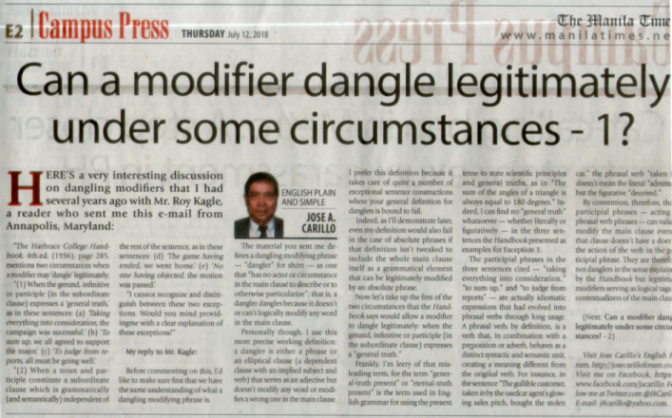Here’s a very interesting discussion on dangling modifiers that I had several years ago with Mr. Roy Kagle, a reader who sent me this e-mail from Annapolis, Maryland:
“The
Harbrace College Handbook, 4th. ed. (1956), page 285, mentions two circumstances when a modifier may ‘dangle’ legitimately:
“(1) When the gerund, infinitive or participle (in the subordinate clause) expresses a ‘general truth,’ as in these sentences: (a) ‘
Taking everything into consideration, the campaign was successful.’ (b) ‘
To sum up, we all agreed to support the major.’ (c) ‘
To judge from reports, all must be going well.’
“(2) When a noun and participle constitute a subordinate clause which is grammatically (and semantically) independent of the rest of the sentence, as in these sentences: (d) ‘
The game having ended, we went home.’ (e) ‘
No one having objected, the motion was passed.’
“I cannot recognize and distinguish between these two exceptions. Would you mind providing me with a clear explanation of these exceptions?”
My reply to Mr. Kagle: Before commenting on this, I’d like to make sure first that we have the same understanding of what a dangling modifying phrase is.
IMAGE CREDIT: BLOG.PREPSCHOLAR.COMThe material you sent me defines a dangling modifying phrase—“dangler” for short—as one that “has no actor or circumstance in the main clause to describe or to otherwise particularize”; that is, a dangler dangles because it doesn’t or can’t logically modify any word in the main clause.
Personally though, I use this more precise working definition: a
dangler is either a phrase or an elliptical clause (a dependent clause with an implied subject and verb) that serves as an adjective but doesn’t modify any word or modifies a wrong one in the main clause. I prefer this definition because it takes care of quite a number of exceptional sentence constructions where your general definition for danglers is bound to fail.
Indeed, as I’ll demonstrate later, even my definition would also fail in the case of absolute phrases if that definition isn’t tweaked to include the whole main clause itself as a grammatical element that can be legitimately modified by an absolute phrase.
Now let’s take up the first of the two circumstances that the
Handbook says would allow a modifier to dangle legitimately: when the gerund, infinitive or participle (in the subordinate clause) expresses a “general truth.”
Frankly, I’m leery of that misleading term, for the term “general-truth present” or “eternal-truth present” is the term used in English grammar for using the present tense to state scientific principles and general truths, as in “The sum of the angles of a triangle is always equal to 180 degrees.” Indeed, I can find no “general truth” whatsoever—whether literally or figuratively—in the three sentences the
Handbook presented as examples for Exception 1.
The participial phrases in the three sentences cited—“taking everything into consideration,” “to sum up,” and “to judge from reports”—are actually idiomatic expressions that had evolved into phrasal verbs through long usage. A phrasal verb, by definition, is a verb that, in combination with a preposition or adverb, behaves as a distinct syntactic and semantic unit, creating a meaning different from the original verb. For instance, in the sentence “The gullible customer,
taken in by the used car agent’s glowing sales pitch, bought the stolen car,” the phrasal verb “taken in” doesn’t mean the literal “admitted” but the figurative “deceived.”
By convention, therefore, those participial phrases—acting as phrasal verb phrases—can validly modify the main clause even if that clause doesn’t have a doer of the action of the verb in the participial phrase. They are therefore not danglers in the sense explained by the
Handbook but legitimate modifiers serving as logical tags or contextualizers of the main clause.
 This essay, 1100th of the series, appeared in the column “English Plain and Simple” by Jose A. Carillo in the Campus Press section of the July 12, 2018 issue (print edition only) of
This essay, 1100th of the series, appeared in the column “English Plain and Simple” by Jose A. Carillo in the Campus Press section of the July 12, 2018 issue (print edition only) of The Manila Times
, © 2018 by the Manila Times Publishing Corp. All rights reserved.(Next:
Can a modifier dangle legitimately under some circumstances? - 2)